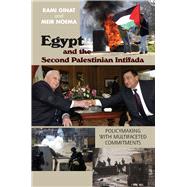
Note: Supplemental materials are not guaranteed with Rental or Used book purchases.
Purchase Benefits
What is included with this book?
| List of Illustrations | p. vii |
| Acknowledgements | p. ix |
| Introduction | p. 1 |
| Egyptian Interests and Considerations | |
| Internal Egyptian Factors | p. 7 |
| The Regional and Inter-Arab Circle | p. 12 |
| Egyptian-Israeli Relations | p. 19 |
| US-Egyptian Relations | p. 24 |
| Egypt's Foreign Policy during the Intifada | |
| On the Eve of the Storm: The Camp David Summit (July 2000) and its Results | p. 33 |
| The Volcanic Eruption: Egyptian Foreign Policy Emphasizes the Regional-Arab Dimension | p. 38 |
| Oscillating between Two Poles: Egyptian Policy between the Sharm al-Shaykh Summit (16-17 October 2000) and the Cairo Summit (21-22 October 2000) | p. 43 |
| Defense vs. Attack: Confrontation between the ôModerateö and the ôRadicalö Camps in the Arab Arena | p. 49 |
| Cracks in the Political-Strategic Triangle of Israel, Egypt and the USA | p. 53 |
| Changes in the ôExternal Spheres of Interestö and Their Repercussions on Egyptian Policy | p. 60 |
| A Warming in US-Egyptian Relations and its Implications for the Egyptian Position | p. 64 |
| The Downgrading of Egypt's Commitment to the Arab Arena in Pursuit of More Balanced Relations with the USA | p. 67 |
| Operation ôDefensive Shieldö - The Israeli Reaction to the Suicide Bombers | p. 72 |
| The Disengagement Plan | p. 81 |
| The Transitions from the Arab Framework to an American-Israeli One | p. 83 |
| Conclusion | p. 90 |
| Appendix: Documents Related to the Palestinian Intifada | p. 96 |
| Notes | p. 115 |
| Bibliography | p. 132 |
| Index | p. 141 |
| Table of Contents provided by Ingram. All Rights Reserved. |
The New copy of this book will include any supplemental materials advertised. Please check the title of the book to determine if it should include any access cards, study guides, lab manuals, CDs, etc.
The Used, Rental and eBook copies of this book are not guaranteed to include any supplemental materials. Typically, only the book itself is included. This is true even if the title states it includes any access cards, study guides, lab manuals, CDs, etc.